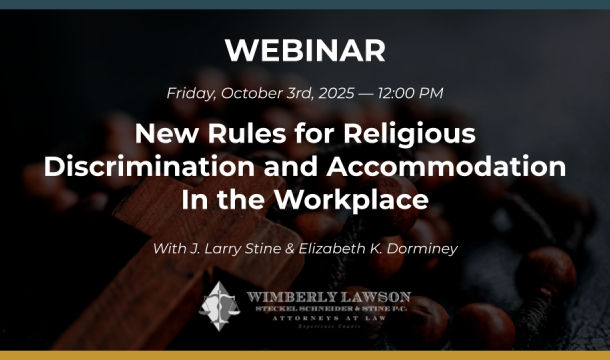What Kind of Documentation Can An Employer Request in Support of a COVID-19 Leave Request?
One of the many questions employers have had about the Families First Coronavirus Relief Act (FFCRA) is this: what kind of documentation can they request from employees to justify a request for paid leave or extended family and medical leave? In a perfect world, an employer can take an employee at his/her word that he/she meets one of the qualifications for leave. But let’s face it—we don’t live in a perfect world, so it is reasonable for an employer to request some kind of evidence to justify an employee’s request for leave. So what can an employer ask its employees to provide by way of proof of a need for leave?
The Department of Labor (DOL) issued a Temporary Regulation on April 1 to help answer that question.
An employee must provide his or her employer documentation in support of paid sick leave or expanded family and medical leave. As provided in § 826.100, such documentation must include a signed statement containing the following information: (1) the employee’s name; (2) the date(s) for which leave is requested; (3) the COVID-19 qualifying reason for leave; and (4) a statement representing that the employee is unable to work or telework because of the COVID-19 qualifying reason.
Furthermore, an employee must provide the following additional documentation depending on the COVID-19 qualifying reason for leave.
- An employee requesting paid sick leave under § 826.20(a)(1)(i) (Employee is subject to a Federal, State, or local quarantine or isolation order related to COVID-19) must provide the name of the government entity that issued the quarantine or isolation order to which the employee is subject.
- An employee requesting paid sick leave under § 826.20(a)(1)(ii) (Employee has been advised by a health care provider to self-quarantine due to concerns related to COVID-19) must provide the name of the health care provider who advised him or her to self-quarantine for COVID-19 related reasons.
- An employee requesting paid sick leave under § 826.20(a)(1)(iv) (Employee is caring for an individual who is subject to a Federal, State, or local quarantine or isolation order related to COVID-19 or directed to self-quarantine due to concerns related to COVID-19) to care for an individual must provide either (1) the government entity that issued the quarantine or isolation order to which the individual is subject or (2) the name of the health care provider who advised the individual to self-quarantine, depending on the precise reason for the request.
- An employee requesting to take paid sick leave under § 826.20(a)(1)(v) (Employee is caring for his or her Son or Daughter whose School or Place of Care has been closed for a period of time, whether by order of a State or local official or authority or at the decision of the individual School or Place of Care, or the Child Care Provider of such Son or Daughter is unavailable, for reasons related to COVID-19) or expanded family and medical leave to care for his or her child must provide the following information: (1) the name of the child being care for; (2) the name of the school, place of care, or child care provider that closed or became unavailable due to COVID-19 reasons; and (3) a statement representing that no other suitable person is available to care for the child during the period of requested leave.
For leave taken under the FMLA for an employee’s own serious health condition related to COVID-19, or to care for the employee’s spouse, son, daughter, or parent with a serious health condition related to COVID-19, the normal FMLA certification requirements still apply.

Kathleen J. Jennings is a former principal in the Atlanta office of Wimberly, Lawson, Steckel, Schneider, & Stine, P.C. She defends employers in employment matters, such as sexual harassment, discrimination, Wage and Hour, OSHA, restrictive covenants, and other employment litigation and provides training and counseling to employers in employment matters.
Related Content
Get Email Updates
Recent Content

Trump Nominates Appointments to NLRB and EEOC but Policy Changes Likely to Be Delayed

DOL Launches Self-Audit Programs Designed to Help Employers Improve Compliance

DOL Must Release EEO-1 Reports to the Public under Open Records Laws

Current Advice on Active-Shooter Situations

New Policy for Federal Workers and Religious Expressions



